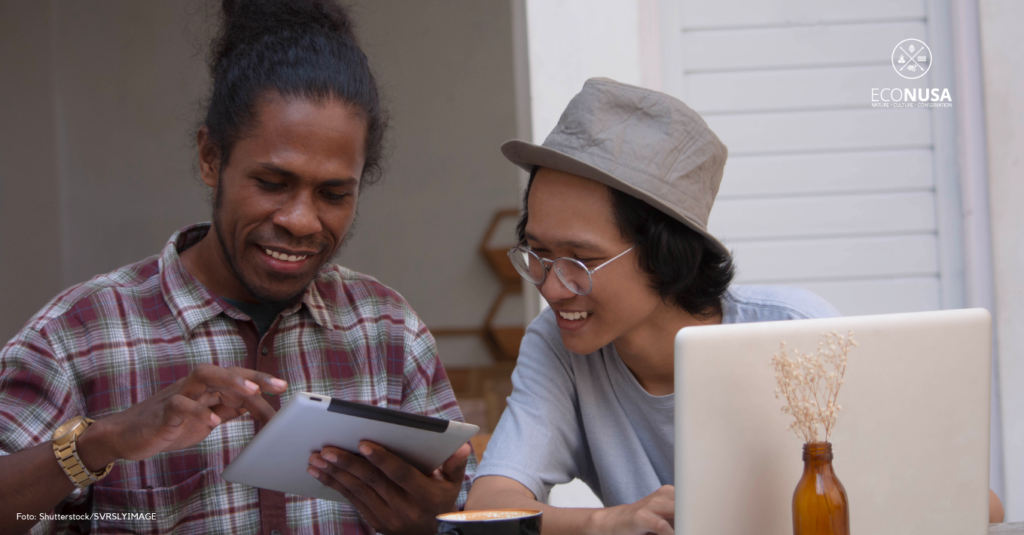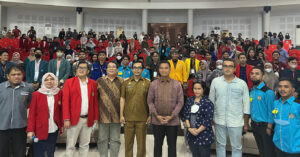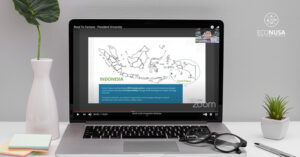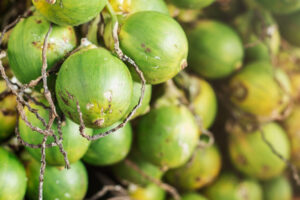
The title is inspired by “Cogito ergo sum” adage. The saying was firstly coined by the French philosopher Rene Descartes in the 16th century which means “I think, therefore I am” that then gains its popularity. It originally came from French which was then translated into Latin.
This article is also inspired by the closed discussion on Environment and Democracy, New Dream for Young Generation in Indonesia organized by EcoNusa in early March 2022.
I am always interested in young generation in Indonesia. They have noteworthy potential to define the future of the country, let alone in such a digital era. Based on the Digital Indonesia 2021 report issued by Hootsuite (We Are Social), Indonesia has around 170 million active social media users or 61.8 percent from the total of populations. The report says Indonesian population at average spends 8 hours 52 minutes a day on internet with any device. Social media users at average spends 3 hours 41 minutes a day. The most popular social media platform in Indonesia is YouTube (93.8 percent), WhatsApp (87.7 percent), Instagram (86.6 percent), and Facebook (85.5 percent).
Tragically, based on the survey conducted by the Development Dialogue Asia (DDA), youth tends to use social media for fun and insubstantial issues. It is no wonder then that heavy issues such as politics, democracy, environment, climate crisis are among the unpopular ones that are out of their favors.
It is also fathomable that environmental issues are yet to be sexy issues among youth. Moreover, according to DDA, 3 out of 10 youngsters are reluctant to be attributed as green activists. As to them, green issue is identical to risky issue with anti-government impression.
On the other hand, we can hardly deny that 41 percent of Indonesian population or more than 110 million is youngsters of 15-39 years of age. The figure also includes young people as the novice voters in the upcoming 2024 general election. Moreover, BBC Media Action survey found that only 15 percent of young generations are dissatisfied and have courage to articulate their critics against the government on environmental issues. This will become a crucial momentum to them to define the Indonesian democracy and politics when they vote their future leader.
I think the above data could be considered as the promising opportunity. Environmental, climate change issues and their impact have happened now. We could not turn blind eyes to these matters when the climate disaster is really taking place. We need future leaders who concern and side with issues on environment, marine, and all of their aspects when climate crisis is on our front door now.
This is the political warming up heading the upcoming 2024 general election. It is the time for youth to have awareness and knowledge on ecology, marine, climate, and democracy. Those issues could be consistently delivered through social media to lure and raise awareness among young generations.
In terms of content, there must be organized movement involving various parties, including networking with organizations, communities, activists, median and even government. The 15 percent young group that is deemed the crusader groups with their ideas could be transformed into social and political capitals. Doing this way, it is expectedly to build long lasting collective and collaborative actions, instead of momentary actions. Such understanding, awareness, and knowledge are deemed the precious capital when they become novice voters in the 2024 election. In this fashion, they will serve as a significant driver to policy makers to side with green issues.
This is what I meant by the title above. By doing digital, therefore youth will exist and play their roles for the country and environment. I have belief that the digital world could mobilize youth. There is a saying, when democracy is not healthy, environment will not be safe. Hence, to save the environment, I hope young people should make democracy healthy. ***
Bustar Maitar




